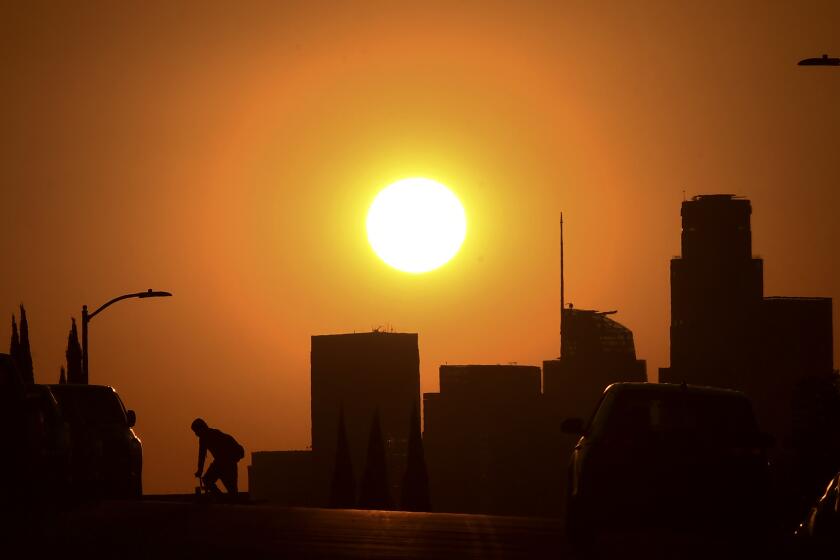Emily Alpert Reyes covers public health for the Los Angeles Times.
1
If you’re suffering through another sweltering day this July, the effects of extreme heat may seem painfully obvious. But the fallout from soaring temperatures goes far beyond sweatiness, dehydration or heat stroke.
“There are a lot of other effects that science is starting to reveal that are problematic,” said Dr. Matthew Strehlow, a Stanford professor of emergency medicine.
Such effects have only gained more attention as heat waves have popped up more often and endured for longer, with 2023 officially marking the hottest year on record for the globe. As scientists keep studying the ways in which extreme heat can shape our lives, here’s what some of their research reveals.
Aggressive and impactful reporting on climate change, the environment, health and science.
2
Violence
In California, researchers who combed through death certificates found that a temperature increase of 5 degrees Celsius was associated with increased odds of homicide mortality.
One analysis of gun violence across 100 cities found that nearly 7% of shootings were attributable to higher-than-typical temperatures in different cities — a percentage that amounted to nearly 8,000 shootings — and that “even moderately hot temperatures were associated with higher risk of shootings.”
Scientists have also linked heat waves to domestic violence. And in big cities in the U.S., higher temperatures were associated with an increase in sexual offenses including rape in the days that followed, researchers at Australian universities found.
3
Suicide
Suicide has also been tied to higher temperatures: In California, the same team of researchers who reviewed death certificates and found higher odds of homicide at higher temperatures also concluded that suicide increased with heat.
Suicide prevention and crisis counseling resources
If you or someone you know is struggling with suicidal thoughts, seek help from a professional and call 9-8-8. The United States’ first nationwide three-digit mental health crisis hotline 988 will connect callers with trained mental health counselors. Text “HOME” to 741741 in the U.S. and Canada to reach the Crisis Text Line.
Scientists in the U.S. and Canada who examined deaths in Toronto and Jackson, Miss., found that “warmer-than-normal temperatures are associated with increasing suicide totals during much of the year” — so much so that ultimately scholars might be able to predict weeks of higher risk for “more focused prevention efforts,” they concluded.
In Louisiana prisons, researchers found that extreme heat was associated with a 30% increase in the rate of “suicide watch” incidents: people being put under observation because a prison staffer believes they are at risk of suicide. That wasn’t surprising to one of the researchers spending time in those prisons.
“If you’re in an environment where you really have no refuge” from extreme heat “and you simply can’t escape that, then I think it could very plausibly lead people to a breaking point,” said David Cloud, now director of research for Amend, a University of California San Francisco public health program focused on prisons.
4
Birth
Heat waves have been linked to a higher risk of babies being born premature, as well as stillbirth. In California, researchers found that babies were more likely to be born before reaching full term if their mothers weathered an “extreme heat episode” in their last week of gestation.
“Heat acts like a trigger for preterm births,” said Tarik Benmarhnia, an environmental epidemiologist at UC San Diego’s Scripps Institution of Oceanography. Benmarhnia said scientists have suggested several possible mechanisms behind that result, including the effects of extreme heat on blood flow in the placenta, inflammatory response and dehydration.
Extreme heat has also been linked to a higher risk of pregnant patients suffering conditions such as preeclampsia and gestational diabetes, researchers have found.
And after a baby is born, Strehlow said, “it’s not clear if extreme heat decreases actual breast milk production or if just dehydration” is causing that result, he said, but it’s clear that when women face extreme heat and struggle to access cooling measures, they report that “breastfeeding suffers.”

A florist on Forest Lawn Drive takes a break in a sliver of shade.
(Zoe Cranfill / Los Angeles Times)
5
Other health problems
“Heat strains every chronic illness we study,” said Dr. Aaron Bernstein, director of the National Center for Environmental Health at the CDC. “So if you have heart disease or diabetes or even chronic obstructive pulmonary disease, heat can play a role in making symptoms of those diseases worse.”
University of Pennsylvania researchers, for instance, concluded that from 2008 to 2019, more than 1,600 deaths from cardiovascular disease annually were associated with extreme heat. Strehlow said studies have found a range of health threats are more common amid extreme heat, including cardiac arrest, heart attacks and ischemic strokes — those caused by a blockage of blood supply to the brain.
He added that researchers have also found that during episodes of extreme heat, “children have more health emergencies and require more hospitalizations.” In general, he said, the longer these heat outbreaks go on, the worse their effects, with each day of excessive heat causing more problems than the last.
Extreme heat will strain power grids and threaten millions more Americans by 2050, a new report has found.
6
School performance
Higher temperatures have been found to affect how students fare on tests. One analysis of New York City high school exit exams found that taking the test on a hotter day — 90 degrees Fahrenheit rather than 72 degrees — led to a 2.5% lower chance of graduating on time from high school.
Researchers examining how students do on tests have found that “even if it’s hotter immediately before those tests, it can affect their performance,” Bernstein of the National Center for Environmental Health said. “And if those tests get tied to getting into college or graduating from high school ... that can have lifelong effects.”
Another analysis of PSAT scores for millions of U.S. high schoolers, published by the National Bureau of Economic Research, concluded that without the aid of air conditioning, “each 1° F increase in school year temperature reduces the amount learned that year by one percent.”
OSHA is weighing national workplace heat rules that could save lives. Meanwhile, California has suffered billions in losses from soaring high temperatures.








